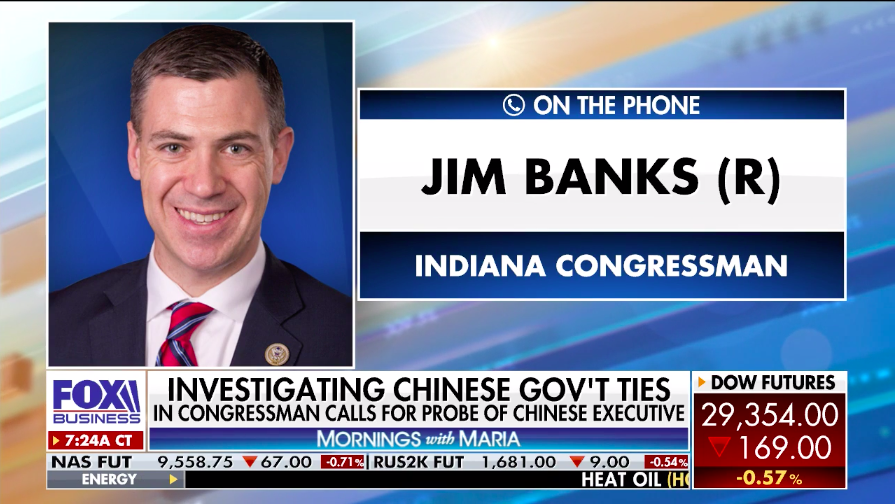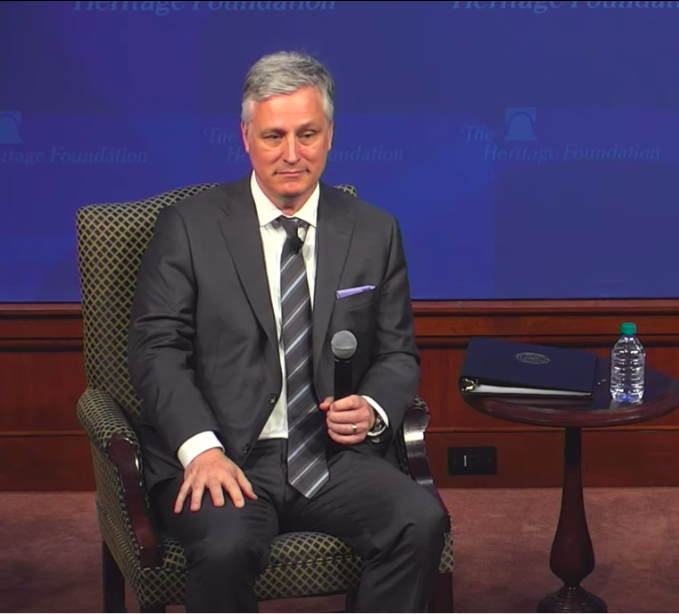
Fox Business guest Rep. Jim Banks on with Maria Bartiromo. (Photo: screen capture, Fox Business)
CalPERS Fails to Answer Rep. Jim Banks’ Questions Regarding CIO’s Ties to China
Mr. Meng said that if he got ‘an opportunity to serve the motherland, such responsibility and honor cannot be compared to anything’
By Katy Grimes, February 21, 2020 9:31 am
California Globe reported last week Rep. Jim Banks (R-IND) sent California Governor Gavin Newsom a letter calling for the investigation of the California Public Employees’ Retirement System Chief Investment Officer Yu Ben Meng, the largest public pension fund in the nation, for his “long and cozy relationship with China.”
“We learned that Mr. Meng, who is the chief investment officer of CalPERS, was actually recruited to this position by the [Chinese Communist Party] through something called the Thousand Talents Program. Now he’s denied it,” Banks said.
In addition to the $360 billion in assets, Rep. Banks said in his letter that CalPERS has a notable history of “shareholder activism.”
“What is unusual is that many of these companies are companies that we’ve blacklisted, that make Chinese military equipment or are responsible for technologies like Hikvision, which is the equipment that’s used by the Chinese for surveillance on the Uighur Muslim population that they’ve been abusing in their own country,” Banks said.
California Globe talked with Rep. Banks this week. Banks was in San Francisco as a member of the “Future of Defense” task force, which he explained is working to combat the China threat today, tomorrow and 30 years form now.
Banks explained that his letter to Gov. Newsom was not partisan, but he wanted to call his attention to the disturbing $3.1 billion of investments in Chinese companies adversarial to the United States, including Chinese tech, military and shipbuilding companies. “It is happening right under Gavin Newsom’s nose,” he said.
“As a Navy veteran and member of the Armed Services Committee and Future of Defense task force, we’ve made the largest investment in American history in our military because we’re trying to keep up with the China threat militarily. Then we find out that federal and state pension funds are invested in Chinese shipbuilding and military… I hope your governor does something about it,” Banks said.
Gov. Newsom hasn’t weighed in publicly on Banks’ letter however, Thursday CalPERS’ CEO Marcie Frost replied to Rep. Banks, neglecting to actually answer his questions:
February 20, 2020
The Honorable James E. Banks
U.S. House of Representatives
1713 Longworth House Office Building
Washington, D.C. 20515
Dear Congressman Banks:
Thank you for the opportunity yesterday to have members of my team meet with your staff to discuss your letter to Governor Gavin Newsom, dated February 12, 2020, regarding the California Public Employees’ Retirement System’s (“CalPERS”) investments in the stocks of Chinese companies. I would like to recap the four key points discussed: (1) CalPERS does not select individual companies in which to invest, (2) California’s Governor does not hire CalPERS’ Chief Investment Officer (“CIO”), (3) the Office of Foreign Asset Control (“OFAC”) is responsible for restricting which equities investors may trade, and (4) CalPERS has a duty to seek returns in the market sufficient to meet the pension obligations to its beneficiaries, not to promote a policy agenda of any persuasion through its investment strategy.
To correct the record, we again explain our global investment approach below. Specifically, we address the CalPERS Board of Administration’s role in selecting the investment strategy, and the use of global indices for passive investing in international equities.
As the largest public defined benefit pension fund in the United States, we manage approximately $400 billion in global assets on behalf of 2 million public employees, retirees, and beneficiaries. We take our duty to pay benefits decades into the future very seriously, as well as adherence to federal law, and our portfolio selection process reflects our commitment to these duties.
The CalPERS Board of Administration sets the investment strategy
The CalPERS Board of Administration (“Board”) consists of 13 members who are elected, appointed, or hold office ex officio. The Board approves investment policies, including the Global Equity investment policy, which sets forth passive investment management in international equities through the use of indices. CalPERS’ Global Equity investment policy sets out our investment objectives, calling for investments in companies internationally to “provide exposure to economic growth.”
CalPERS has been investing in international equities for decades
The growth and development of emerging markets and the expansion of global growth generally over the last few decades have been an important development for pension funds. Like many public pension funds across America, CalPERS provides its beneficiaries with a defined benefit. CalPERS’ global investment portfolio is necessary to meet its 7% investment return target to pay retirement benefits for its members. Accordingly, CalPERS holds $200 billion in stocks from companies based in nearly 50 countries, including the United States. Approximately 1% of our total fund is invested in Chinese companies and passively managed through our indexed public equity portfolio.
Global investments are made by using a leading index in compliance with federal law
CalPERS invests in international stocks using two well-established indices: the MSCI and the FTSE. Indices are created to track publicly traded stocks, bonds, and consumer prices for common goods and services. By design, indices track the performance of a selected basket of stocks that are selected by the index creator based on preset criteria. By using an index-based investment strategy, CalPERS makes passive investments. Passive investing is a “buy-and-hold” strategy, meaning CalPERS will purchase and maintain ownership of stocks over a multi-year time horizon to provide long-term value. CalPERS uses the MSCI and FTSE indices because they are commonly used for investments outside of the United States.
In 2019, the FTSE and MSCI modified their respective indices to include China A-Shares, thereby increasing their exposure to Chinese equities. CalPERS rebalanced its portfolio in light of these changes accordingly, resulting in the removal of 143 stocks and the addition of 198 stocks. Nearly half of the companies added were Chinese companies because the MSCI and FTSE indices changed to include China A-Shares. Rebalancing involves periodically buying or selling assets in a portfolio to mimic the indices. As discussed, the index providers, not CalPERS or its CIO, decide which equities are included in the indices.
Importantly, index providers must develop indices that only include companies that the U.S. Government has determined are permissible for investment. OFAC is responsible for restricting which equities investors may trade in, blocking investments in certain stocks to protect national security. CalPERS takes these restrictions very seriously, thereby operating in full compliance with OFAC’s rules. Accordingly, and critically, CalPERS does not have any holdings in any company that OFAC has blocked from investment.
Pension funds across the United States invest through indices
As mentioned above, CalPERS uses the MSCI and FTSE indices as do many public pension funds across America, including the Indiana Public Retirement System in your home state. According to a report released by Aon in October 2019, the MSCI and FTSE indices “remain the most popular indexes for U.S. based institutional investors investing in overseas equity markets. Including an international equity option with a material allocation to emerging markets equities is considered best practice in the marketplace, exemplified by adoption among public plans, defined contribution plans, and target date funds.”
It is regrettable that your office did not contact CalPERS to check the facts before publishing baseless accusations. We are always happy to provide factual information related to all aspects of CalPERS’ business.
Respectfully,
Marcie Frost
Chief Executive Officer
A 2017 article in the Chinese newspaper Society People, reported Meng was then recruited to the position at SAFE by Beijing’s Thousand Talents Program, which provides funding to U.S. citizens in exchange for information. Meng left CalPERS, and then came back.
Rep. Jim Banks replied to CalPERS CEO Marcie Frost Friday morning:
“CalPERS failed to answer two fundamental questions raised in my letter to Governor Newsom. First question: Is Mr. Meng a member of the Thousand Talents Program, something the FBI called a ‘non-traditional espionage program?’ Second question: Since Meng came back as Chief Investment Officer of CalPERS, has CalPERS invested in companies that are affiliated with the Chinese People’s Liberation Army?
“In addition to these questions, I’d like clarification from Mr. Meng about what he meant when he told the Chinese communist rag People’s Daily that his ‘roots were in China,’ and why he said that if he got ‘an opportunity to serve the motherland, such responsibility and honor cannot be compared to anything.’
“I look forward to hearing CalPERS address these national security concerns.”
CalPERS also created a brand new “fact sheet” about their investments, including, “CalPERS has been investing in China for decades.”
CalPERS included this at the end of their fact sheet:
What is the role of the CalPERS Board in investment decision-making?
The CalPERS Board sets broad investment strategy and approves the asset allocation for the pension fund’s investment portfolio. The board also approves investment policies, including the Global Equity investment policy, that sets forth passive investment management through the use of indices.
This is patently untrue – It is common knowledge that CalPERS does make investments based on policy and politics. CalPERS has divested from Israel, tobacco,
Wayne Winegarden of the Pacific Research Institute, issued an analysis of 18 ESG funds (Environmental, social and governance criteria) in 2019 that found only two outperformed a broad market index fund over 10 years,” Calpensions reported. “Tobacco divestment, reconsidered by the board in 2016, had cost CalPERS $3.6 billion as of last year.”
All losses to the CalPERS pension fund are then made up and funded by the California taxpayers.
“Governor Newsom, if it were up to me, I would fire Mr. Meng immediately,” Banks wrote in the letter to Gov. Newsom. “At the least, I think a thorough investigation of Mr. Meng’s relationship to the Chinese Communist Party and a comparison of CalPERS investments in Chinese companies before and after Mr. Meng’s 2008 hiring are both warranted.”
- What is Trump’s Plan B After Supreme Court Strikes Down Tariffs? - February 20, 2026
- New BLS Data Shows Union Membership Drives Falling Flat - February 19, 2026
- NY Federal Reserve Tariff Report an ‘Embarrassment’ - February 19, 2026





2 thoughts on “CalPERS Fails to Answer Rep. Jim Banks’ Questions Regarding CIO’s Ties to China”